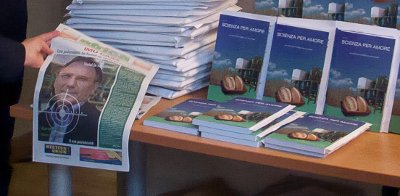International Book Fair of Turin – May 12, 2012

The conference on “Hyst technology: from waste to food and energy for all” was held at the Villa Amoretti City Library as part of the International Book Fair of Turin on 12 May 2012.
On this occasion, “Science for Love. Reality doesn’t need to be defended: it just needs to be told” was presented. A book that looks at the vicissitudes of the association that funded the development of Hyst: a technology potentially able to resolve food and energy related problems starting from materials considered “waste”.
The conference was opened by Dr. Francesca Luciani of the National Health Institute (Istituto Superiore di Sanità) who illustrated the possible applications of Hyst technology in human nutrition and animal feed sectors. In particular, with regard to human nutrition Dr. Luciani explained how – from bran and the by products of milling industries – Hyst processing can produce flour with extremely high contents of proteins, vitamins and micronutrients. “Using the bran produced annually worldwide alone we could be giving well over 2 tons of flour to 6,500,000 children under the age of five dying of hunger every year”, concluded Dr. Luciani.
Next came Engineer Pier Paolo Dell’Omo (Department of Astronautical, Electrical and Energy Engineering at the University of Rome). Eng. Dell’Omo outlined the principles underlying the functioning of this technology, highlighting Hyst’s potentials in the energy sector. In fact, with Hyst pretreatment of waste materials such as cereal straw it is possible to produce biomethane at very low costs (about 0,53 € per litre of gasoline equivalent). The quantities produced are sufficient to meet the European requirements of substituting 10% of transport fuels with biofuels by 2020. Dell’Omo also presented a concrete example, in the form of a pilot project, of Hyst applications in developing countries. This pilot project is part of Bits of Future: Food for All, whose goal is to optimize the use of resources in areas with problems related to food shortage. Through synergistic integration between agricultural, industrial and farming activities we create a “closed cycle where virtually everything is used and there is no longer any form of waste”.
To close the conference, Barbara Carrubba, the Head of External Relations of the Scienza per Amore Association, told the story of the humanitarian project Bits of Future: Food for All (intended for African countries), presenting the book Science for Love. Reality doesn’t need to be defended: it just needs to be told. The book relates the history and vicissitudes of the Association which supported and funded the experiments conducted about Hyst technology. Soon to be published is a second volume collecting the testimonies of associate members: “people who have dedicated their lives and resources to funding this technology” explained Barbara Carrubba. “Our goal is not to alter any balances – she continued – but to make HYST technology available to African countries […] we want to provide a tool with which each country can make use of the resources they have.”
- Download the slides of the interventions (italian version)



